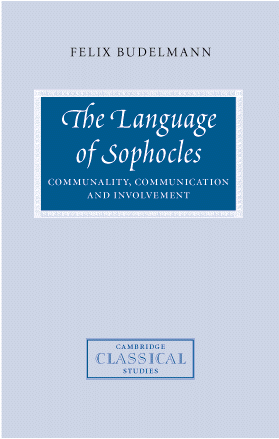Book contents
1 - Sentences: a shared world
Published online by Cambridge University Press: 15 August 2009
Summary
INTRODUCTION
At the heart of this book is an interest in how Sophoclean language communicates. In particular, I am interested in how Sophoclean language can engage many different spectators by giving them a degree of information but no complete knowledge, prompting them to use what they know for struggling with what they do not know. In later chapters the spotlight will be on the effects language has on the way characters are perceived, on language about myth and prophecies, on language about gods, language used by the chorus and on many other aspects of Sophocles' language. In those chapters it will be necessary to discuss the language of continuous passages, scenes and even plays. Before opening out the view on such lengthier stretches of text, I will look in this chapter at a number of individual sentences, at their structure and their word order.
By discussing unconnected sentences, this chapter adopts the preferred format of scholars such as Campbell, Long and Moorhouse, who are interested mainly in the formal aspects of Sophoclean language, and much indeed that I will say is based on their work. Yet at the same time this chapter is designed in various ways to go beyond the scope of Campbell, Long and Moorhouse, and will eventually lead into the increasingly wide-ranging discussion of the following chapters, which are more in the style of most of the recent work on Sophocles.
- Type
- Chapter
- Information
- The Language of SophoclesCommunality, Communication and Involvement, pp. 19 - 60Publisher: Cambridge University PressPrint publication year: 1999



